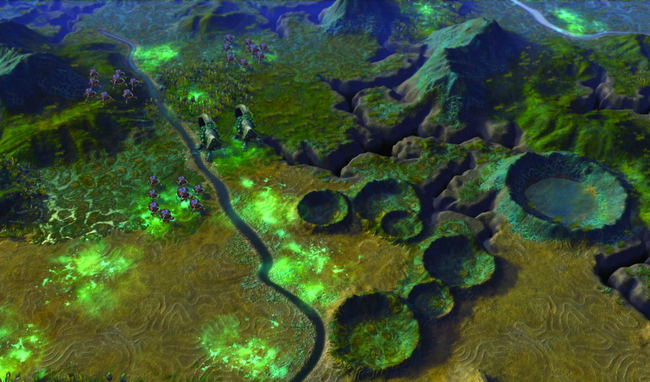Part of the team behind Civilization V and its many successors are now using the same engine they built for those games for a new spin-off title, which while part of the Civilization franchise is also intended to stand separate from the main series games. Called Civilization: Beyond Earth, the name alludes to its core conceit – taking the concept of Civilization intergalactic and seeing you settle not Earthen lands, but a whole new alien world.

Sounding familiar? The idea of colonizing an alien planet through the medium of turn-based strategy has certainly been seen before – over ten years ago, in fact, in cult classic Alpha Centuri. But even though the concepts may be similar, the team baulk at suggestions that their game is in any way a successor, pointing to numerous significant differences between the two titles.
Chief among these is that Beyond Earth doesn’t just follow the history of a single planet. “Our story begins with hundreds or even thousands of colony spaceships leaving Earth for potential new planets during an event called the Seeding,” explains Dave McDonough, one of the many members of the game’s Design team. “The idea is that every time you play a game, you pick up the story of one of those planet settlements.” Indeed, the Sci-Fi theme of the game and lack of focus on a particular planet offers the team an unprecedented freedom in defining the history of the lands you’ll play – something that, according to producer Dennis Shirk, is being taken full advantage of.
“When you started out in Civ V and you had Genghis Khan on one side of the map and Montezuma on the other, you had a very good idea of what your game was going to be like. Lots of pain and suffering, burning cities (laughs) … But because Beyond Earth is a total sci-fi game and we can do what we want, the leaders will have distinct personalities, and a flavor to them, but wanted each experience to feel completely different.”
Before you get taken to your randomly-chosen planet and begin to colonise it, however, you first have to make preparations back at Earth for your trip. This involves you deciding on what equipment to take with you; and setting up the faction you’ll be representing. You have a choice of eight factions, each completely distinct from each other; but that isn’t the limit to your choices – players can choose their colonists, cargo, and choice of spacecraft during the seeded start. The team are eager to give players the ability to customise their game however they like; and every decision affects the scenario you’ll end up with when the game officially starts.
“The factions do have named leaders that are representatives of their group. But the identity that your faction has is much more under your control. The first thing you do in the game is customize the colony ship and the expedition itself, and the faction leader is just the first step in that process.” – Dave McDonough

Speaking of the planet you’ll be colonizing, Civilization: Beyond Earth will make a strong attempt to emphasise the “alien” nature of your new territory with a wider range of geographical features, including some very strange structures. The game is taking a different approach in its mechanics as well. No longer will your technological advances follow a generally linear pattern; instead, Civilization: Beyond Earth is adopting a branched approach. A “technology web” will see you choosing to develop technology through three main branches, each of which ultimately leads to a different win condition for the overall game – but the team is keeping mum on the details for now.
Finally, the orbital satellite system is being overhauled. You’ll now build them like any other unit, so you’ll need to manage your resources effectively. When placed on the map, they can give passive bonuses like adding to research or food production, buff ground forces or help with terraforming, give a small combat ability or increase your field of vision. The satellites will degrade over time and eventually fall to orbit and explode, so they can’t be permanently relied on – though hopefully by the time they’re lost, you can replace them with better kinds. To make matters worse, your enemies will also be able to shoot them down. So investing heavily in satellites comes at a huge risk/reward dynamic.
Multiplayer is also already in the works for the new title, with the quality assurance teams already playing multiplayer matches against each other, although features are still being planned and implemented. Nevertheless, Shirk says the Multiplayer element of the game “will be ready for action when the game ships”.
Will Civilization: Beyond Earth also take a different approach to storytelling? Alpha Centuri was memorable for its approach to telling the story of its game world as you played, with an over-arching story that would be slowly introduced to you via text interludes as the game progressed that detailed the growth of the planet’s sentience. According to the team of Beyond Earth, we won’t see a strong overarching storyline here which leads the game down one single path; instead, a quest system will allow more emergent and random storytelling to take place. “Some of the early quests are based around exploration, or building your first new settlement, while others are complex, multi-part quests which feed into the victories within the game. They also help convey some information about the game and world to the player, and help people keep track of their progress towards victory,” they said.
But whether or not Beyond Earth comes to be seen as either Alpha Centuri or a truly original title, the very idea of taking Civilisation to outer space and playing a turn-based sci-fi game that’s based on a single planet, which is chosen by your early decisions and evolved through your actions within it – rather than jumping from system to system – is extremely exciting.

